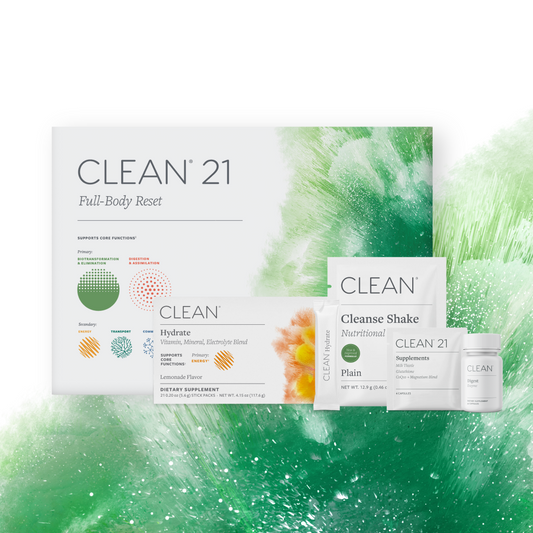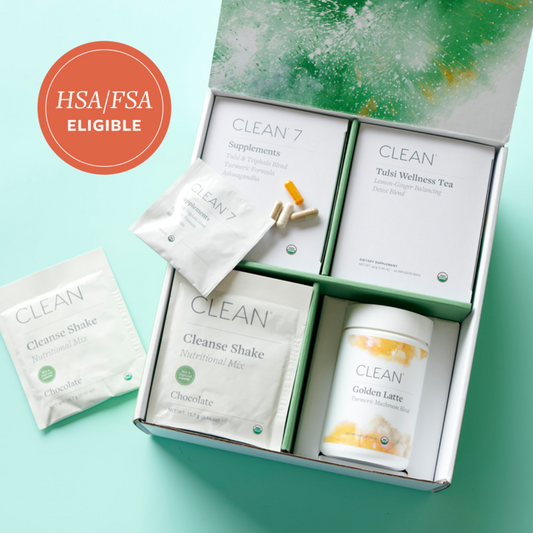
How to Boost Your Immune System and Strengthen a Weak Defense with 13 Key Tips

In our fast-paced world, it's easy to be stressed out, have a poor diet, and be running on caffeine due to lack of sleep. All of these factors can affect the immune system. Over time, these can build up and lead to frequent illness or even chronic diseases.
If you want to stay strong and healthy all year, nothing is better than giving the body a little extra love to help boost a weak immune system. Today, we’re listing our top 13 tips on how to boost a weak immune system to help your body stay healthy, even after you've gone through our 21-Day Clean Program. That way, if you do end up catching a cold, these suggestions will help speed up your recovery.
Why Does Immune Health Matter?
Your immune system works tirelessly to protect your body from harmful pathogens and other health threats. However, factors like poor diet, lack of sleep, chronic stress, and even overexposure to environmental toxins can weaken its defenses. By proactively supporting your immune system, you’re investing in long-term health, energy, and vitality.
13 Lifestyle Practices to Boost a Weak Immune System
1. Increase Activity
Reduced activity, especially in winter, can cause us to drag and feel off. Physical exercise works to bring balance to your immune system. Movement can support your detox organs, keep your lymph moving, and give a natural boost to a weak immune system.
Even if you do an activity for a minimum of twenty minutes a day, you'll feel the benefits in the long run. Plus, you'll get the added benefit of boosting your cardio or strength - depending on your exercise of choice!
2. Spend More Time Outside
When we spend too much time indoors, we can’t benefit from fresh air and sunshine, which can improve our mental health and immunity. Also, getting outside can help keep vitamin D levels balanced. Vitamin D is an important component in keeping the immune system strong. It's thought that colds and flu run rampant in the winter partially because vitamin D levels tend to be lower since the days are shorter.
If you combine the first two points on this list, you'll be able to get an amazing boost. Even if all you do is take a twenty-minute walk, every little bit counts.
3. Get Adequate Sleep
The greatest tool for stress reduction that can boost a weak immune system is sleep. When you sleep, think of your body as going into 'repair mode', working to repair injuries and strengthen your immune system. If you're not getting enough sleep, you feel groggy and awful the next day. But after enough days of no sleep, you may notice your overall wellness suffer.
Optimize your sleep and commit to at least 8 hours a night. Turn off screens two hours before bed and keep your bedroom dark and electronic-free.
4. Reduce Alcohol Intake
Be mindful of alcohol consumption. Too much dehydrates your body and depresses your immune system, making it easier to get sick.
Alcohol can also affect your sleep cycle, which in turn can affect your immune system.
If you do have a night out, make sure to hydrate before going to sleep.
5. Wash Your Hands
If we learned one lesson from the pandemic, it was the importance of washing our hands. In fact, since everyone was more mindful of washing up, there was a significant decrease in the spread of the flu.
Even though we hear it all the time, it bears repeating: Wash your hands with hot water! Especially after using your computer or phone, and before making food. And make it a habit to clean your devices since they tend to carry a lot of bacteria from us touching them!
6. Take Vitamin D3
Take vitamin D3 daily. If you’re not spending time in the sun, consider taking 2,000 IU as a maintenance dose. During winter, take 3,000-5,000 IU of vitamin D3 to help reduce your chances of contracting a cold. And if you can squeeze in time to briefly get outside, even a few minutes in the sun can be helpful.
7. Take Probiotics
Why take probiotics? Taking probiotics helps our bodies usher out toxins we encounter from our food and water. Additionally, they help modulate your immune system and fight sickness-causing invaders. When our guts become imbalanced from bacteria, it can make us sick. Keeping a good probiotic in your arsenal can help balance gut bacteria and help you feel better.
8. Take Digestive Enzymes
Often, a weak immune system is triggered by undigested food particles. Digestive enzymes help us digest the foods we eat by improving our nutrient assimilation and supporting our immune function. Take enzymes with meals, especially if they are fatty or restaurant food.
9. Add a Nutrition Shake to Your Daily Routine
Supportive nutrients and proteins are key to a properly functioning immune system. Having a healthy protein shake is an excellent way to get the micronutrients your immune system needs in a tasty and easy-to-take form.
10. Add More Fruits and Veggies to Your Diet
Bump up your intake of plant foods and green powders. Plant phytonutrients help to relieve stress, reduce inflammation, and revive a weak immune system.
11. Limit Sugar and Processed Foods
Excessive sugar can suppress immune function, making you more vulnerable to infections. Opt for whole foods, such as fruits, vegetables, lean proteins, and healthy fats, which provide sustained energy and essential nutrients without compromising immune health.
12. Remove Irritating Foods From Your Diet
Gluten, dairy, sugar, caffeine and alcohol are the most common foods that cause irritation, sensitivities, and allergies. Be intentional about when you eat these foods and swap in clean, whole foods as much as possible.
13. Do a Yearly Gut Health Cleanse
The 21-Day Clean Program is the ultimate immune support system. It reduces many food items and unhealthy habits that can overburden us. We recommend doing an extended cleanse program at least once a year to give your body a chance to clean house and show it some much-needed appreciation.
Start Your Journey to a Stronger Immune System
Having a cold every once in a while can be a bummer, but it happens to the best of us. However, if you find it happening more frequently than it should, take some time to examine your lifestyle. It's absolutely possible to boost your immune system and take control of your life. Soon, you'll be waking up every day feeling energized and ready to take on the world.
Ready to take the next step? Clean Program offers a 21-Day Full Body Reset and natural health supplements designed to make healthy living accessible. Discover our expertly crafted cleanse and see how they can boost your energy and wellness naturally.
Written by the Clean Team
Sources:






